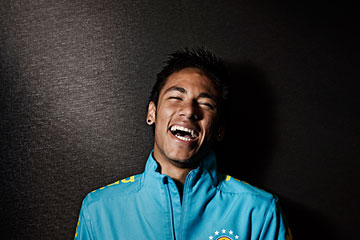
Neymar earns enough at Santos to decline lucrative overseas offers
As the spiky-haired young man hailed by all of Brazil as the Next Pelé places the ball on the penalty spot, I sit rigid with anticipation on a field-level seat barely 10 m behind the goal. Moments later, the blurry orb comes straight at me with explosive speed, freezing me in fear. In the instant before the ball catches the net I know the utter hopelessness a goalkeeper must feel when Neymar da Silva Santos Jr. bears down on him. Then the stadium erupts, and all eyes follow the superstar as he wheels away in jubilant celebration, followed by a whooping pack of teammates.
It's the last game of the 2012 league season at the history-laden Vila Belmiro Stadium in Santos, the coastal municipality in southern Brazil that gave the world O Rei do Futebol, or King of Soccer, as Pelé is known. And it is entirely apt that the current claimant to his crown should play for his club, Santos FC, and on his happy hunting grounds. If it weren't for poor health, the great man himself would be watching from his box seat as Neymar — in the best Brazilian tradition, he goes by a single name — notches two goals and one assist in Santos' 3-1 trashing of Palmeiras.
The win was, at best, a small consolation for Santos fans. One of Brazil's most successful club teams ended the season a disappointing eighth in the Campeonato Brasileiro, or Brazilian Championship; its only serious silverware of the year was the state championship of São Paulo. This was a huge comedown from the 2011 season, when a Neymar-inspired Santos won the Copa Libertadores, South America's equivalent of the Champions League.
But as they streamed out of the Vila Belmiro under the watchful gaze of riot police, the fans were in an exultant mood. "We won the most important thing of all," said Jele, a young graphic artist who also goes by a single name. He pointed to a giant poster of Neymar that looms over a bronze bust of Pelé. "He is staying. And as long as we have him, we can win everything."
That Brazil's most precious athletic asset isn't being sold off to a superrich European team says less about the team's loyalty to its fans than it does about Brazil's power as a rising economy. Despite flat growth last year, Brazil's past decade of economic expansion, about 4% annually, and increasing national wealth has shown up in many places, from aircraft and auto manufacturing to information technology and its huge agricultural sector. Rich Brazilians have reinflated Miami's busted real estate market. At home, poverty is shrinking. Unemployment, a record-low 5.5%, has been falling as wealth is being spread.
It's not that Brazil lacks problems: crime rates remain high, vast slums scar the urban landscape, poor infrastructure makes for epic traffic jams and hurts business. But issues like corruption that retard developing nations are finally being addressed with muscular investigations and trials, and a booming private sector is producing world-class businesses.
That progress is nowhere more evident than in Brazil's professional soccer league. It's no surprise that a country famously overabundant with superb players should export its surplus — some 1,500 a year leave for foreign leagues — but in recent years, there's been a spike in the number of returning players: more than 1,100 went home in 2012, up from 974 in 2008. Brazil's trade deficit in footballers narrowed to 315 last year from 556 in 2008. In large part, this is because the Brazilian league, just like its economy, has become more sophisticated and profitable. Not surprisingly, struggling Argentina, Brazil's great rival, is the world's leading exporter of soccer talent — its brightest star, four-time Ballon d'Or winner Lionel Messi, plays in Spain.
Neymar is a Messi-class talent. He's a player whose ability to change speed and direction is augmented by astonishing ball skills. There's an unaffected effervescence to his game, a refreshing change from the calculated efficiency of European soccer that has infected the Latin American leagues since the 1980s. In an era of pass-and-move, Neymar is not afraid to keep the ball, dribble and weave past his opponents rather than simply figure out the most effective way of moving it forward. It's too early to say if he's as good as Pelé, but he certainly plays with the King's sense of sheer joy. "He plays like Brazilians used to, without cynicism," says Juca Kfouri, the country's pre-eminent soccer commentator. "He plays with a wink and a smile, like he's having fun."
